Episode 51, "Laws and Promises” (FINALE) Review
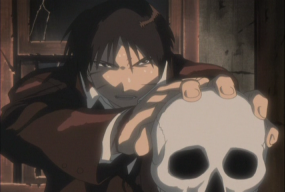
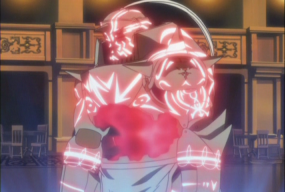
*****SPOILERS*****
Synopsis: As Edward lies in a pool of blood, Envy gloats over his victory. Frank Archer makes his way to the Fuhrer’s residence, where Roy’s flame alchemy is having little effect on Pride. Pride warns Roy that if he succeeds, the public wouldn’t embrace him. Suddenly Selim Bradley arrives, but Pride panics and is in pain when Selim holds up his "secret treasure". The Fuhrer strangles Selim, but Roy manages to get ahold of the "treasure", which turns out to be a skull, a piece of Bradley’s original body. Roy uses it and his flames to get an advantage over Pride. In Dante’s lair, Alphonse uses alchemy to disable Gluttony. Dante tells him not to, as he’ll waste away, but Alphonse is desperate to save his brother’s life. Before Envy can attack him, Alphonse activates the arrays Dante set up. Roy finishes Bradley off, destroying the skull, but as he carries Selim out of the residence, Archer arrives and shoots him. Archer is shot dead by Riza, who is devestated to find Roy injured. At the Gate, Edward warns Envy not to go through the Gate, but he does to go find Hohenheim. Edward awakens in Dante’s lair, with both his human arms, Rose by his side, and Dante and Gluttony gone. Dante tries to escape the underground city, but an out of control Gluttony lunges at her before she’s able to do anything. Edward decides to sacrifice himself to bring Alphonse back from the Gate. Time passes. The government had taken back the country. The military has reversed their policies on Ishbal. Roy Mustang is recovering with Riza Hawkeye at his side. Alphonse Elric has returned to his human body, without memories of what had happened during the brothers’ journey. Edward had disappeared. Alphonse requests that Izumi train him more so that he can find a way to reunite with his brother. Back on the other side of the Gate, Edward and Hohenheim are in Munich, Germany, in 1921. Edward studies rocketry, hoping he can find a way back home through space. Edward wonders if all he’s been through was worth it, but Hohenheim tells him that all he went through was the price he paid. Edward and Alphonse are both determined to reunite.
– Fin
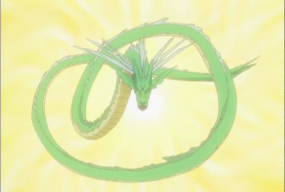
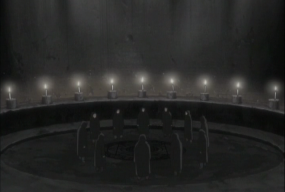
Comments:
The finale of the first Fullmetal Alchemist TV series provides us with a good ending, but also sets up for a possible sequel, which we get with the movie.
Envy says a big "Fuck you!" to the dangers of the Gate by opening it up and going into it, hoping to find Hohenheim on the other side and kill him. For a moment it looks like the Gate children are going to just take him apart, which would have been a great end for him, but he suddenly transforms into a dragon and makes his way through the light. It probably would have helped had we seen Envy transform into animals in the series before he did this, but at this point, it seems more symbolic than anything else (though the movie makes him a literal dragon, which is odd). In the end, his obsession with killing Hohenheim is what removes him from the equation.
By the way, that scene at the Gate? Only the fourth time Edward’s cried in this series. The first time was shortly after Winry’s parents died, the second was when Nina died, and the third was when he almost got killed by (flesh-and-blood) Barry the Chopper. And those other three were during the "younger Elrics" arc. So all this bullshit about Edward being "emo" is a tad exaggerated, huh? Yeah, he dispairs, but really, he just as often overcomes. He’s maybe a little more sullen in this series, but "emo"? Well, you’re stupid if you even use that term.
Pride, meanwhile, meets his end because he entrusted his weakness to a kid too eager to please his father. Why the homunculi have a tendancy to keep their weakness near them is beyond me. Well, at least Greed and Pride seem to have this flaw. They should just toss their weakness into a river or something. Maybe they’re desperate to keep a reminder of their state in life, but that’s never explained. However, the scene where Roy Mustang finishes Pride off is really awesome. I love the use of music in this scene and Roy’s line, "How many times do I have to kill you before you die?" There wasn’t really much of a fight, but it was a memorable confrontation.
That being said, I never thought that Selim Bradley died until somebody mentioned it to me. You see, it’s possible to have your neck broken and still be alive. I figured because Roy is carrying Selim out of the house that he must be alive, because who would waste their energy carrying a dead body out of a burning building? If they’re dead anyway, it’s not going to help them. But I guess Roy is the kind of guy who, having seen children burn in the war (by his hands, often), he wouldn’t want Selim’s body to burn. Or something along those lines.
It’s in that scene that we get the last of Archer. My question is, if he’s basically one big gun, why does he then need to use a pistol? Did he really run out of ammo? How does one load mouth ammo? Well, whatever the case, Riza arrives a little late and Roy is injured, but she manages to take Archer out for good. The scene of her crying over Roy’s crumpled form was heartbreaking, even if he did later turn out to survive.
Dante meets her end in a very undignified way. Trying to escape via the Fuhrer’s elevator, Gluttony catches up with her, and still being mostly just hunger, he can’t reason, and her attempts to reason with him are thus futile. Before she can do anything, he lunges at her, and the elevator opens with the two of them gone, so we can assume that they either took each other out, or Gluttony ate her and left (we see which in the movie). I like this ending for her, because really, Dante’s not so important at this point. She’s already been defeated by the Stone being used before she could, and being killed by her own actions via Gluttony is fitting. She was playing with fire for too long and she was finally burned. Well, she was probably heartburn later on.
One of my favorite parts of the episode is when Alphonse stands up. At this point, his brother is presumed dead, and he’s sort of given up on himself as just being the Philosopher’s Stone because of Envy’s words. However, he can take it no longer, and decides not to just allow himself be used while his brother dies, and doesn’t care about Dante’s warnings or Envy’s attacking, he’s going to sacrifice himself if it means the person he cares about the most in the world can live. This is a great scene showing the power of Al’s will, which ultimately means Dante’s defeat. It’s not Edward’s skills that beat her, but Alphonse’s decision to save his brother at the cost of his own life.
Likewise, Edward is willing to sacrifice himself to bring Alphonse back, as well, even after having his missing human limbs back. I really like the scene where he does just this, with the "camera" turning around as he readies himself in the alchemy array. I presume he used his complete self, body and soul, to pull Alphonse body and soul out of the Gate and back to Amestris. So both brothers sacrificed themselves for each other. But this meant that Edward ended up back in our world without his arm and leg, while Alphonse is human again, but de-aged, and without memories of his journey with Ed. They’re both in seperate worlds, and have paid a hefty price for retaining their lives. But both are determined to find each other again.
Edward and Hohenheim end up living in Munich, Germany, which in 1921 started a period of hyperinflation. Thus the poverty in the streets and Hohenheim’s comment about the price of apples. He also seems to be a member of the Thule Society, a German occultist group, which later sponsered the Nazis. Two notable members which Hohenheim walks with are Karl Hausofer (who talks) and Rudolf Hess (there, but silent). They’re interested in "magical circles" it seems, and Hohenheim is looking for a way back to Amestris, likely not for himself, but for Edward. Edward, meanwhile thinks he can get to Amestris again via space travel, which is why he’s researching Robert Hutchins Goddard and wants to meet with Hermann Oberth in Transylvania. Good luck with all that, Edward.
With the Fuhrer gone, there are still wars, but apparently a governmental assembly are now in control of the country. Now, this seems a little sudden, but we see that they were supported by Grumman and Armstrong. Without Bradley’s influence, the council probably didn’t have a lot of ability on their own. The policies on Ishbal are reversed, and it looks like they’re all be resettled. We see that Rick and Leo are being polite to the outcast, probably owing to Edward’s comments to them about their parents’ beliefs not always being right. Rose and her baby seem to be living in Risembool with Winry (though Winry apparently ends up in Rush Valley to train herself in automail making). Wrath has been fitted with automail and ran off. Alphonse is going for more alchemy training with Izumi. I love the sense of things moving on.
Alphonse still believes in Equivalent Exchange. However, he doesn’t believe it as some strict rule, but rather a promise made between him and his brother to meet again some day. The final scene where Edward and Alphonse are both on trains, on their way to find a way to reunite is a really amazing one that etches itself in your memory. It’s a great final scene.
I also like Roy’s take on the world not being perfect, which is why it’s so beautiful. Sure, plenty of effort was made and sacrifices were made, but not everything came back perfect, but many of the characters were somewhat rewarded for their efforts. Equivalent Exchange isn’t perfect.
The production values are, as expected, excellent. The art is sharp and distinct. I love the detail in the scenes in Munich and the sort of faded color that fits the mood of the time period. The animation, especially Roy’s flames, are excellent. It also helps that they use my favorite musical composition of all time, Chopin’s "Opus 10, Etude No. 3", or "Tristesse" ("Sadness"), which in the OST is "Tune of Seperation". They use both a piano and string version. It’s such a touching piece and it’s used perfectly in this episode. I also love the piece called "Sin" which starts when Roy gets ahold of the skull and continues until Alphonse activates the alchemy arrays. Voice performances are top-notch in the Japanese cast and decent in the English dub (with the usual exceptions of Envy, Hohenheim, and Winry). It’s a real emotional episode and the production values work that.
There were a few little flaws with the episode, like Envy suddenly becoming a dragon, the government switching over to democracy a little too quickly, but as far as I’m concerned, these are minor and not very problematic. I still think this is a powerful conclusion to a great show. Er, but then there’s the movie.
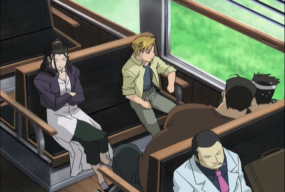
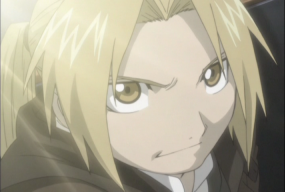
Overall Score:
5 out of 5
